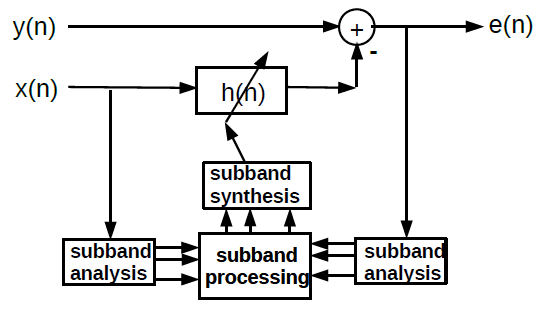Due to the length of the impulse response filter, adaptive filtering is often carried out in the frequency subband domain. The subband analysis and synthesis stages will always introduce a delay to the signal to be processed. However there are many applications that require low delay or zero delay. One example is the In-Car-Communication (ICC) system that has become a major feature for automobile infotainment systems.
VOCAL provides a solution with zero signal delay for adaptive filtering tasks such as feedback or echo cancellation. We achieve zero signal delay by separating the signal path from the signal monitoring and control processes. The signal processing systems are essentially divided into a time domain unit which removes the feedback or echo and frequency domain unit which derives control information for the time domain processing. The following diagram sketches the VOCAL zero-delay feedback and echo cancellation system.

By the clear separation between cancellation and subband processing, we eliminate completely the signal delay caused by the subband analysis and synthesis blocks. All traditional subband processing for monitoring and decision making are still contained in the frequency domain and no loss in
performance is induced.
The zero delay approach requires minimum additional computation in comparison with traditional feedback or echo cancellation approaches. However when there are other functional blocks that are also applied to the signal path, such as, noise reduction, all must be moved out of the signal path together with feedback or echo cancellation function.